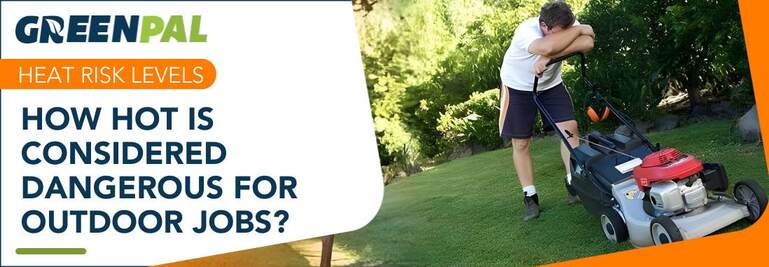How hot is too hot to work outside?

Millions of Americans earn their pay sweating through the work week. So how hot is too how? The answer to that question varies according to your overall physical well-being and the type of physical activity one is performing. No matter what your working environment is your body tries its best to maintain its normal internal temperature.
The human body functions best at 98.6 degrees. When the temperature outside exceeds that, cooling of the body becomes very difficult. Sweating, caused by blood circulating to the skin, is one of the only ways to get rid of excess heat but is only effective if the humidity level is low enough to cause evaporation. If the body cannot release the excess heat, it will store that access heat and that becomes very dangerous.
Signs of Dehydration
Signs of dehydration include the following:
- Little or no urine, or urine that is darker than usual
- Dry mouth
- Sleepiness or fatigue
- Extreme thirst
- Headache
- Confusion
- Dizziness or lightheaded feeling
- No tears when crying
So what actual temperature is too hot?
According to OSHA , The heat index, which takes both temperature and humidity into account, is a useful tool for outdoor workers and employers.
Heat Index |
Risk Level |
Protective Measures |
Protective Measures |
Lower (Caution) |
Basic heat safety and planning |
91°F to 103°F |
Moderate |
Implement precautions and heighten awareness |
103°F to 115°F |
High |
Additional precautions to protect workers |
Greater than 115°F |
Very High to Extreme |
Triggers more aggressive protective measures |
So how do I protect myself?
Saki Migkos with Greek Lawn Care in Charlotte North Carolina says he stays safe in hot conditions by:
"I keep a 5 gallon cooler of water on the truck at all times, we dont ever leave the shop without it."HYDRATE!! Make sure you are drinking water before, while, and after your encounter with the heat. For every 20 minutes that you are working under these conditions, you should drink at least one cup of water. Your body depends on water to survive. Every tissue, cell, and organ in your body needs water to work correctly and uses it to maintain the proper body temperature. Also, wear loose fitting clothes because those will allow the evaporation of sweat more easily from your skin. Also avoid beer and other alcoholic drinks. No thirsty? Try eating some of the most hydrating foods. The list includes celery, watermelon, cucumbers, kiwis, bell peppers, any citrus fruits, carrots, and pineapple.
Also, make sure you are taking breaks and cooling off in the shade if it's possible.
It doesn't matter if you are mowing the lawn in Murfreesboro, Tennessee or landscaping in Lakeland, Florida, this type of manual labor is taxing. I can relate to the hard work it takes to make a living by doing this. For 6 years, I worked with a landscaping company and it was the hardest job I have ever had. So all of you earning your paychecks by sweating for hours upon hours, I say thank you and stay safe.
Working in hot conditions can be risky, as the body struggles to maintain its normal temperature when the external temperature exceeds 98.6 degrees. High humidity levels can further impede the body's ability to cool down, leading to dangerous heat storage. Dehydration is a serious risk, indicated by symptoms like dark urine, dry mouth, fatigue, and confusion.
To stay safe, OSHA recommends using the heat index to gauge risk levels for outdoor workers. Staying hydrated with water, wearing loose clothing, taking shade breaks, and avoiding alcohol are crucial measures for those working in the heat, such as in landscaping or lawn care jobs.



 Share
Share







